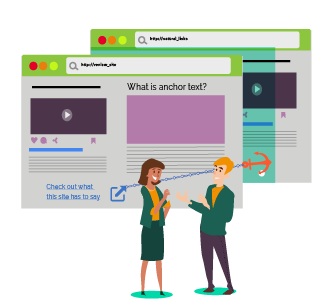Are you at an SEO stand-still?
You’ve followed all the on-page SEO rules and advice. And you’ve created lots of killer content, all based on what your target audience are searching for. You’ve optimised both your website’s content and technical SEO, making it more accessible for both your site visitors and search engine bots. And you’ve even taken some extra steps to ensure your website is optimised for mobile.
And yet, you’re just still not quite seeing the results you expected.
This is where off-page SEO can help
Rather than thinking about everything that features on your website, have you ever stopped to consider what impact everything that happens off of your website has on your SEO? Off-page SEO is important.

Today, search engines aren’t just interested in what you have to offer on-page. They want to make sure you’re a reputable source of information, providing genuine help and guidance on a searcher’s query.
But my content is good
You could be creating the best content in the world. But unless you’re a reputable and credible source of knowledge, no search engine will believe you.
And so, in order to rank highly with today’s complex algorithms, you need to make sure you’re fully optimised. This means optimising both your on and off-page SEO.
What is Off-Page SEO?
Off-page SEO (also called off-site SEO) is key to establishing your website as an authoritative online presence. In short, it’s any action you take outside of your website. These actions boost your search engine results pages (SERPs) rankings, website traffic, and conversions.
Optimising your website for off-site factors involves improving the overall “popularity’ of your website as perceived by search engines and people performing Google searches.

By improving your relevance and trustworthiness, you can establish yourself as authoritative and start ranking higher. You can accomplish this by linking back to your website through other people, sites and pages.
It's more than link building
Many people often associate off-page SEO with link building, but that is only part of the process.
When building your off-page SEO, backlinks are a huge benefit, but they are not the end-goal. The end-goal is to improve your visibility, presence and popularity by establishing yourself as authoritative and trustworthy.
Therefore, off-page SEO includes:
- Building content for social media and guest-blogging
- Strengthening relationships with other brands and influencers
- Creating a strong profile of backlinks
All of this will help to create a satisfying experience. One that is positive for both for prospective visitors, and the search engine bots that are crawling your site.
Be prepared to manage multiple SEO strategies
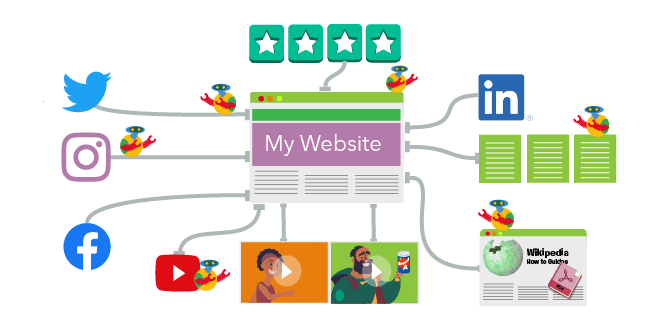
Although SEO is a rapidly changing scene, your off-page SEO is still equally as important as your on-page optimisation.
After all, in the words of SEO guru Wendy Piersall, ‘Google only loves you when everyone else loves you first.’
It’s like if you were to open a brand new restaurant. You may be a Michelin-standard chef with the friendliest front-of-house team. And you might have a 5* hygiene rating, to boot. But unless you get some glowing reviews, you may never find yourself fully booked.
When increasing your brand awareness online, ensure you let both searchers and search engines discover how wonderful you are.
Why You Can’t Afford to Ignore Off-Page SEO
Off-page SEO is key to building your reputation as a credible voice in your industry. If done well, you can give your brand more exposure. You can also use external sources to raise your reputation and direct more searchers towards your site.
Let’s take a closer look at why off-page SEO is so important for your website.
1. Improve Your Rankings

A high rank is not based on good on-page SEO alone. You could have the greatest content, but in order to rank well, you need to leverage off-page techniques.
Off-page SEO is all about boosting your authority and credibility by improving your site’s relevance, trustworthiness and authority.
This can be achieved by other reputable places on the internet (websites, social media, reviews, etc.) linking to your website. Or when people are actively talking about your brand online. It’s like a virtual shout-out for you and the quality of your content.
Credibility is a major player when it comes to your rankings
In recent years, Google introduced the concept of Expertise, Authority and Trustworthiness (E-A-T) into their algorithm.
E-A-T now plays an important role in a website’s ability to rank.
Simply put, Google will prioritise websites that demonstrate expertise and authority.
This is because they know that searchers will be provided with accurate and relevant content. One of the ways they do this is by looking at the frequency, and types of citations that exist online.
Therefore, you should create quality and purposeful content. Content which other people identify as being relevant and high-quality. Thus, putting you in the best position possible to rank highly.
2. Increase Site Traffic
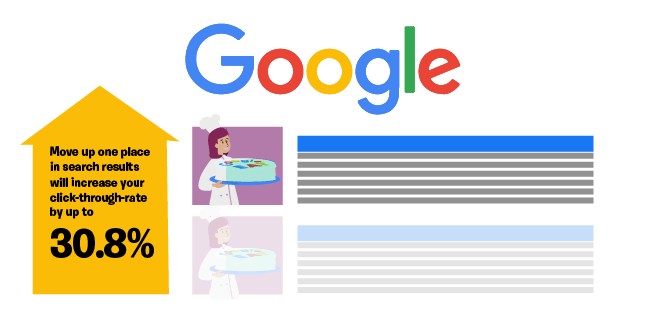
Did you know, on average, moving up one place in search results will increase your click-through-rate by up to 30.8%?
Your rankings and site traffic go hand-in-hand. If you can improve your rankings, you’ll likely see an increase in your website traffic too. Especially if you rank highly for a high-volume search term.
But even if the volume for a particular search query is relatively low, you can still benefit. This is because a smaller, niche group of visitors, are more likely to convert.
Don't forget backlinks
Putting rankings to one side for a moment, an increase in site traffic can also be credited to the backlinks you’ve obtained.
An established website can do wonders for your website when it comes to building trust for new audiences.
Ideally, you’ll want websites with a good domain authority to link externally to your site, as this is more valuable.
The visitors on these high authority sites are likely to trust their recommendations and click through to yours.
And, if these credible sources already have large amounts of traffic going to their site, even better. Receiving just a portion of them through external links can significantly increase the amount of visitors coming to your site.
3. Brand recognition and reputation
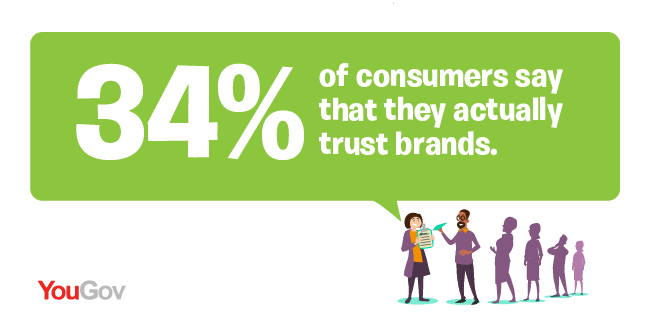
Unfortunately, these days people trust brands less and less. In fact, according to a recent YouGov poll, only 34% of consumers say that they actually trust brands.
This is one of the reasons why influencers have soared in popularity. They’re actual people that recommend or advocate for products and services. Not an unseen face or voice behind a logo.
And people tend to trust other people over faceless brands – it’s just a basic part of human nature.
What are your customers saying about you?
The things people say about you off your website are extremely important. They play a huge role in determining whether new visitors will trust and engage with your site.
Most of these new visitors will form opinions about your brand before they have even visited your website.
These opinions are formed through product reviews, social media and comments from friends. Your marketing campaigns will also play a part, as will any other sources of information on the internet.
Off-page SEO plays a hugely important role when it comes to influencing these opinions. You want to ensure that everything that references your website is positive.
Engage with your customers
If you receive a negative review on your social media or review sites such as Trustpilot, reach out to that individual. Find ways to remedy their problem. If you don’t, it could be detrimental to your business. That one review could stop lots of potential customers from even considering whether to engage with your brand.
Of course, you can’t control what other people write or say about you. And so you want to make sure that everything your company does – from marketing to customer service – is at the highest possible standards.
Going back to the restaurant example above – if one person claims to have seen rats in the kitchen, and makes enough noise about it, then it’s going to have a detrimental effect on the amount of future business you will receive.
4. Improve local SEO
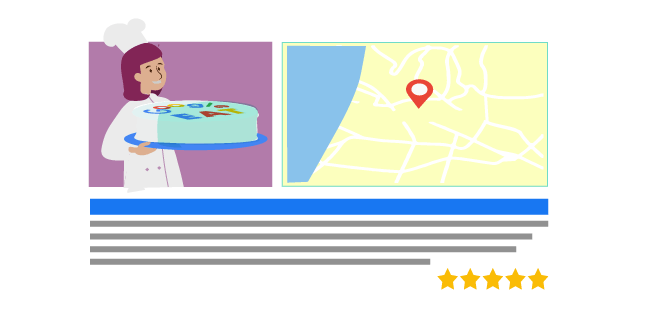
If you’re a business with a local presence, then off-page SEO can do plenty of great things for your reputation in the local area.
Reviews and ‘word-of-mouth’ play a huge role in traditional brick-and-mortar businesses. And the same applies to your online presence.
Encouraging customers to leave reviews and share their experience online is essential. It can have a huge impact on your business, especially if you’re a local service provider.
These reviews can even influence your local SEO rankings, helping you to reach and serve even more potential customers.
Summary
Today, search engines are a lot more complex, and will look externally for proof of your authority.
Therefore, you need to optimise both your on and off-page SEO for best chances of success.
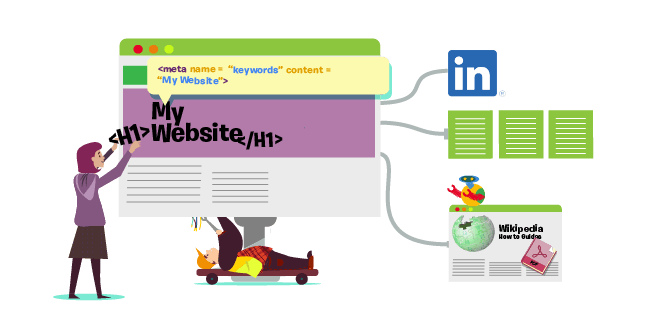
There are a lot of benefits to prioritising your off-page SEO. It can also make or break your business, with reviews and external recommendations playing a huge part in influencing consumer’s decisions.
Short on time?
As with any other aspect of SEO, off-page SEO needs to be planned and approached properly. And to do it effectively involves time and effort. This is partly why so many businesses outsource their SEO.
As a professional marketing consultant, I know the ins and outs of off-page SEO. My team and I have worked with various clients across a range of sectors.
So, if you’re looking to outsource your SEO, why not contact me today for an obligation-free chat. It’d be great to hear about your company and how we could work together in the future.




